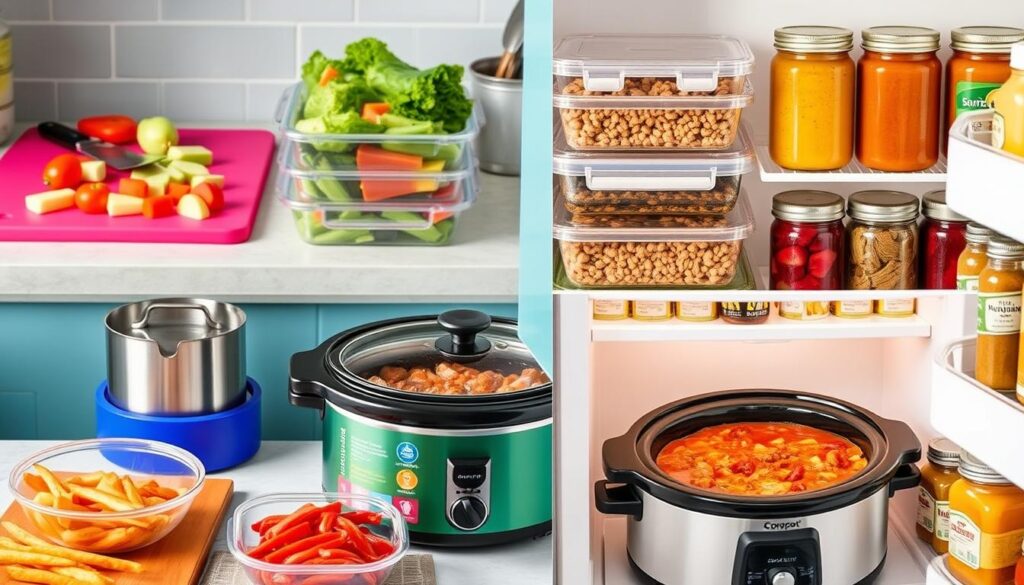Modern life is all about being efficient. Time-saving meal prep is a big help for busy people. It lets them save hours in their week. It’s not just about cooking faster. It’s about making food and kitchen stress easier.
Imagine coming home after a long day and having a tasty, healthy meal ready in minutes. Quick cooking is now possible. With smart meal prep, you can spend less time in the kitchen. You’ll also make healthier choices and feel less stressed about what to eat.
Meal prep isn’t about being perfect. It’s about finding ways to make cooking fit your life. Whether you work, have kids, or just want to eat better, these tips will change how you cook and eat.
Key Takeaways
- Reduce daily cooking time with smart meal preparation
- Minimize stress and decision fatigue around meals
- Create healthier eating habits through planning
- Save money by reducing impulse food purchases
- Enjoy more free time with efficient cooking strategies
Why Smart Meal Prepping is Your Time-Saving Solution
Meal planning is more than a kitchen trick. It’s a game-changer for your daily life. By learning about its benefits, you’ll see how it can make your life better.
Good meal prep is not just about cooking ahead. It’s a way to improve your life in many areas. It helps you balance time, money, and health, reducing stress and improving your diet.
Understanding the Benefits of Strategic Meal Planning
Strategic meal planning has many benefits beyond cooking:
- Reduces daily decision fatigue
- Cuts grocery spending by 20-30%
- Minimizes food waste
- Supports consistent nutrition goals
Breaking Down the Time-Money-Health Triangle
| Aspect | Impact | Benefit |
|---|---|---|
| Time | Saves 3-5 hours weekly | More personal time |
| Money | Reduces impulse purchases | Lower grocery bills |
| Health | Ensures balanced nutrition | Consistent wellness |
The Psychology of Successful Meal Prep
Meal prep psychology shows that planning helps you feel in control and less stressed. By setting up routines, you can eat healthier and feel less anxious about food choices.
“Meal prepping isn’t about perfection, it’s about progress and making healthy choices easier.” – Nutrition Expert
Knowing these psychological benefits can turn meal prep into a positive weekly ritual. It supports your overall well-being.
Essential Tools and Equipment for Quick Meal Preparation
Starting a meal prep routine is easier with the right kitchen tools. Smart tools can cut down cooking time and make prep work simple. Choose versatile gadgets that make cooking faster.
- Food Processors: Chop, slice, and dice in seconds
- Slow Cookers: Hands-off cooking for busy individuals
- Instant Pot: Multi-functional cooking marvel
- Quality Storage Containers: Meal organization made simple
Both pros and home cooks say the right tools are crucial. Time-saving gadgets are not just conveniences—they’re investments in your culinary productivity.
“The right tools can transform meal preparation from a chore to a creative experience.” – Culinary Expert
| Kitchen Tool | Time Saved | Versatility Rating |
|---|---|---|
| Food Processor | 30-45 minutes | 9/10 |
| Instant Pot | 40-60 minutes | 10/10 |
| Slow Cooker | 60-90 minutes | 8/10 |
When picking meal prep tools, focus on multi-purpose items. Look for gadgets that save time, reduce cleanup, and make cooking fun.
How to Meal Prep Without Spending Hours in the Kitchen
Meal prepping doesn’t have to take forever. You can learn quick ways to prep meals that make kitchen time efficient. It’s all about working smarter, not harder.
Being efficient in the kitchen begins with planning and smart food prep. Using batch cooking and streamlined methods can cut down your cooking time a lot.
Time-Saving Preparation Techniques
- Invest in quality food processors for rapid chopping
- Use sheet pan meals for minimal cleanup
- Prep ingredients while waiting for other items to cook
- Create multiple meals simultaneously
Batch Cooking Fundamentals
Batch cooking changes how you prep meals. Cooking big batches of versatile ingredients lets you make different meals all week.
| Ingredient | Prep Time | Storage Duration |
|---|---|---|
| Grilled Chicken | 30 minutes | 4-5 days |
| Roasted Vegetables | 45 minutes | 5-6 days |
| Quinoa | 20 minutes | 7 days |
Storage Solutions That Work
Good food storage is key to keeping meals fresh and preventing waste. Get high-quality, airtight containers for fridge and freezer use.
“The secret to successful meal prep is not just cooking, but storing your meals correctly.” – Professional Chef’s Wisdom
With these quick prep and storage tips, your kitchen time will become less stressful. Batch cooking gets easier with practice and the right methods.
Smart Shopping Strategies for Efficient Meal Prep
Learning how to shop for groceries can make meal prep easy and stress-free. It’s not just about saving money. It’s about making your meal planning smooth and efficient.
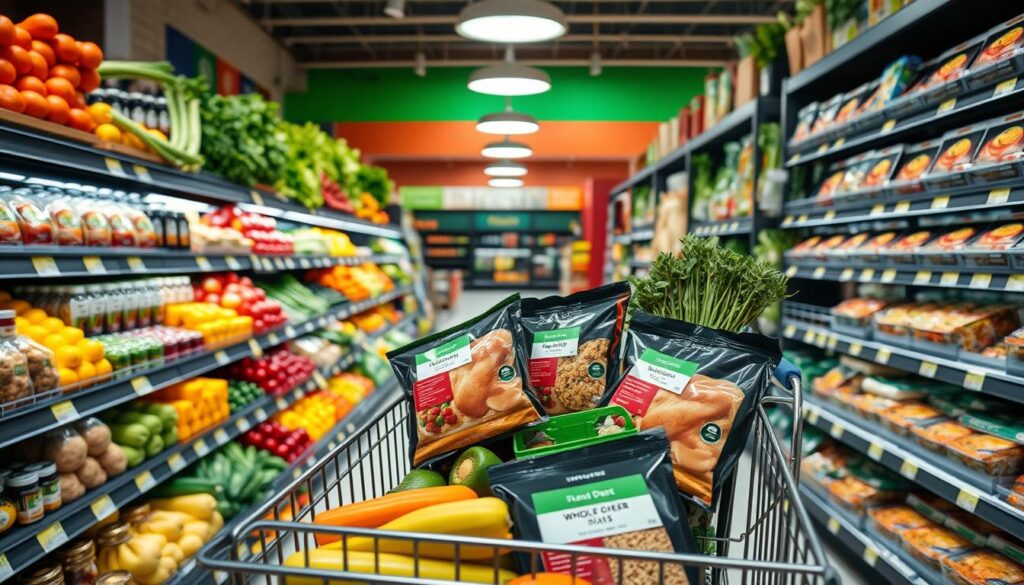
Choosing the right ingredients is key to smart shopping. It’s about finding a way to shop that reduces waste and saves time.
- Plan your menu before shopping
- Create a detailed grocery list
- Focus on versatile ingredients
- Check your pantry before leaving home
Bulk buying can really help if you’re watching your budget. Not all bulk purchases are created equal, so choose wisely.
| Ingredient Category | Bulk Buying Potential | Storage Tips |
|---|---|---|
| Proteins | High | Freeze in portion sizes |
| Grains | Medium | Store in airtight containers |
| Vegetables | Low | Buy fresh, prep immediately |
“The secret to successful meal prep is not just what you buy, but how you buy it.” – Meal Prep Expert
By using these shopping tips, you’ll make meal prep faster, cheaper, and waste less food. Smart shopping is the first step to efficient meal planning.
Building Your Weekly Meal Prep Schedule
Creating a meal prep schedule makes planning meals easier. It turns a big task into a simple process. It’s all about managing your time well to fit healthy meals into your busy life.
Morning vs. Evening Prep Sessions
Deciding between morning or evening prep depends on your energy and schedule. Here are some points to consider:
- Morning Prep Benefits:
- You’re full of energy and motivation
- The kitchen is less busy
- It sets a positive tone for the day
- Evening Prep Advantages:
- You have more relaxed time
- Longer cooking times are okay
- It fits better into your workday
Organizing Your Prep Flow
Make your meal prep more efficient by organizing it well. First, pick your recipes and check what ingredients you have. Then, plan when you’ll prep each meal. Use good storage containers to keep everything fresh and tidy.
“Successful meal prep is 50% planning and 50% execution” – Professional Nutritionist
Time Management Tips
Here are some tips to make your meal prep more efficient:
- Batch cook common ingredients
- Use tools that do more than one thing
- Clean as you go to avoid mess later
- Stick to a weekly schedule
Using these tips will make your meal prep smoother. It will save you time and reduce stress from cooking every day.
Quick and Versatile Base Recipes
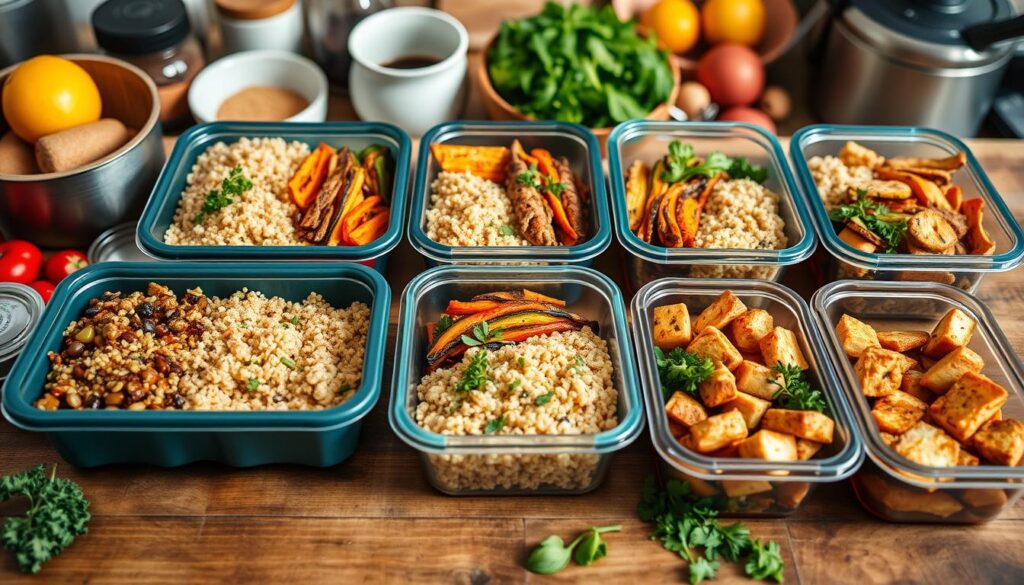
Creating basic meal prep recipes can change your weekly cooking. Versatile food bases are key for busy cooks. They help plan meals faster and reduce stress.
“Meal prep is about working smarter, not harder in the kitchen.” – Professional Chef Recommendation
Now, let’s look at some quick cooking ideas. These are great bases for many dishes:
- Quinoa: A protein-packed grain perfect for salads, bowls, and side dishes
- Brown rice: Adaptable base for stir-fries and grain bowls
- Roasted sweet potatoes: Versatile ingredient for breakfast, lunch, and dinner
Knowing how to make multipurpose ingredients is key for meal prep. A smart approach to base recipes can change your meal planning.
| Base Recipe | Prep Time | Potential Dishes |
|---|---|---|
| Roasted Chicken | 45 minutes | Salads, Wraps, Grain Bowls |
| Quinoa | 15 minutes | Breakfast Bowls, Lunch Salads, Side Dishes |
| Vegetable Medley | 30 minutes | Stir-Fries, Pasta Additions, Grain Mixes |
Pro tip: Always season your base recipes with versatile spice blends to keep meals interesting throughout the week.
Make-Ahead Protein Options for the Week
Preparing meal prep proteins in advance can change your weekly cooking routine. Planning ahead with make-ahead meat dishes and vegetarian options saves time. It also ensures you have tasty, healthy meals all week.
Smart protein preparation begins with knowing different cooking methods and flavors. The right approach keeps your meals exciting and fulfilling.
Marinades and Seasonings That Elevate Proteins
Marinades are crucial for turning simple meal prep proteins into delicious dishes. Here are some flavorful options:
- Citrus-herb marinade for chicken
- Smoky chipotle seasoning for tofu
- Mediterranean spice blend for plant-based proteins
Cooking Methods for Diverse Protein Sources
Different proteins need unique cooking methods to keep their texture and flavor.
| Protein Type | Best Cooking Method | Prep Time |
|---|---|---|
| Chicken Breasts | Baking/Grilling | 25-30 minutes |
| Tofu | Pressing & Baking | 40-45 minutes |
| Tempeh | Marinating & Sautéing | 20-25 minutes |
| Ground Turkey | Slow Cooking | 35-40 minutes |
“Meal prepping is about working smarter, not harder.” – Professional Nutritionist
For vegetarian protein options, batch-preparing legumes, tofu, and tempeh is a good idea. These ingredients can be seasoned and cooked ahead. They provide nutritious protein for many meals.
- Use airtight containers for storage
- Label containers with preparation date
- Refrigerate within 2 hours of cooking
Vegetable Prep Shortcuts and Storage Hacks
Learning quick vegetable prep tips can make meal prep fast. Keeping produce fresh is key for cooks who want to save time and avoid waste.
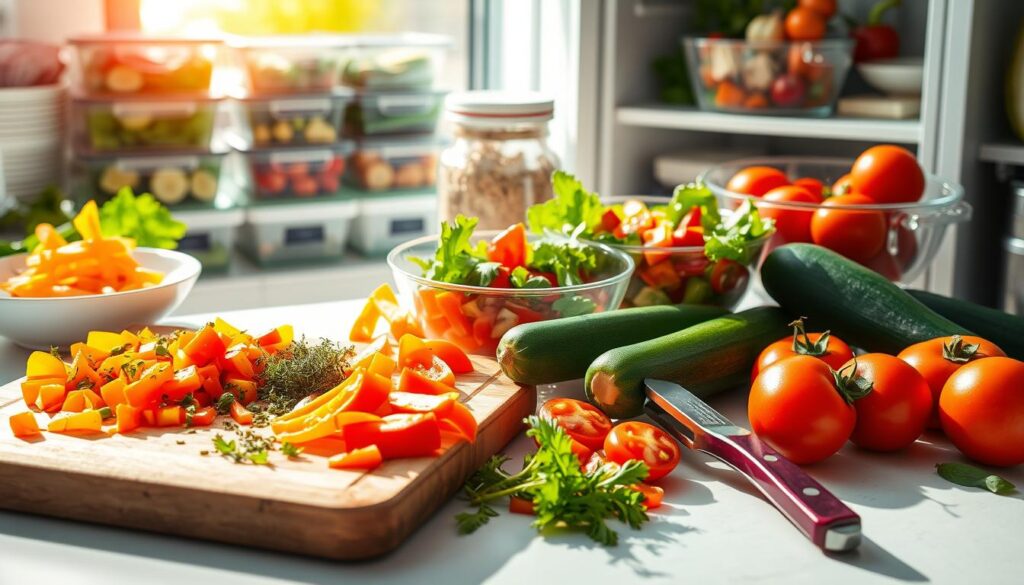
Smart vegetable hacks can greatly reduce kitchen time. Start with a few essential tools for easier prep:
- Sharp chef’s knife for quick chopping
- Mandoline slicer for uniform cuts
- Food processor for rapid chopping
- Large cutting board with non-slip surface
“Preparation is the key to stress-free cooking” – Professional Chef’s Wisdom
Proper storage of produce is crucial. Each vegetable needs its own storage to stay fresh:
- Root vegetables: Store in cool, dark places
- Leafy greens: Wrap in damp paper towels
- Herbs: Trim stems and store in water like flowers
- Mushrooms: Use paper bags to prevent moisture buildup
Blanching vegetables is a quick trick. Quickly boil vegetables for 2-3 minutes, then immediately transfer to ice water. This keeps them fresh for freezing or quick cooking.
Pro tip: Prepare vegetables in bulk on weekends. Wash, chop, and store them in clear containers. This makes weeknight meals easier and less stressful.
Mix-and-Match Meal Components
Creating tasty and healthy meals is easy. It’s all about mixing ingredients for the best nutrition and taste. By learning how to mix different foods, you can make cooking fun and quick.
It’s important to know how to mix food groups for healthy meals. You need to balance proteins, carbs, and veggies. Also, don’t forget about portion control.
Creating Balanced Combinations
Good meal prep comes from smart ingredient choices. Here are some great pairings:
- Lean proteins with complex carbs
- Roasted veggies with grains
- Seasoned proteins with fresh veggies
Portion Control Guidelines
Right portions are key for balanced meals and avoiding too much food. Here are some tips:
| Food Group | Recommended Portion | Visual Comparison |
|---|---|---|
| Proteins | 3-4 oz | Palm-sized portion |
| Carbohydrates | 1/2 cup | Cupped hand |
| Vegetables | 1-2 cups | Fist-sized serving |
“Meal prep is not about perfection, but about creating sustainable, nutritious eating habits.”
Using these tips for mixing foods and portion control will help you. You’ll make meal prep easy and keep your diet healthy and tasty.
Food Storage Solutions and Container Organization
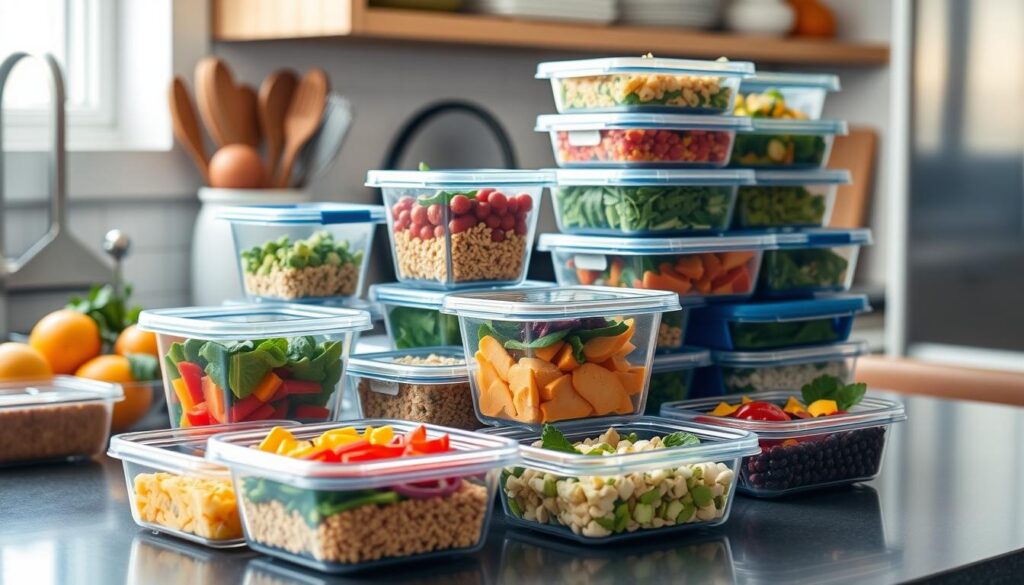
Mastering food storage is key to successful meal prep. The right containers can change your kitchen and make meal prep easy and efficient.
Choosing the right containers is important. Look for ones that are:
- Leak-proof
- Microwave-safe
- Dishwasher-friendly
- Stackable for easy storage
Pro tip: Invest in clear, glass containers with secure locking lids for best results.
“A well-organized kitchen is the secret weapon of successful meal preppers.” – Professional Chef Recommendation
Organizing your kitchen is more than just picking containers. Here are some tips to boost your meal prep:
- Label containers with meal name and date
- Use color-coded containers for different meal types
- Arrange containers by meal category in the refrigerator
- Store ingredients in separate compartments
Glass containers with compartments are great for meal prep. They keep proteins, grains, and veggies separate and fresh.
Effective meal prep containers save you time and keep your kitchen organized. Choose well and make meal prep easy and stress-free.
Maintaining Food Quality Throughout the Week
Keeping your prepped meals fresh and safe is all about planning and smart techniques. Meal freshness tips are key to not wasting your kitchen efforts. Temperature control is the most important factor in keeping food quality and stopping bacteria growth.
“Food safety isn’t just about cooking—it’s about smart storage and handling.”
Proper storage is crucial for meal quality. Here are important strategies to keep your prepped meals fresh:
- Store proteins and cooked meals in airtight containers
- Keep refrigerator temperature below 40°F
- Use clear containers to easily track meal age
- Label containers with preparation dates
Reheating techniques are vital for your meal’s taste and texture. Always reheat meals to 165°F for safety. Microwave reheating works best in short intervals, stirring between each to spread heat evenly.
Different foods need different storage methods. Salads and raw veggies stay crisp when stored separately from dressing. Grains and proteins can be stored together, but keep sauces on the side to avoid soggy textures.
Tracking meal freshness is simple. Most prepared meals stay safe and tasty for 3-5 days when stored right. Trust your senses—if something smells bad or looks off, throw it away.
Conclusion
Efficient meal prep is more than just cooking. It’s a lifestyle change that cuts down stress and boosts your nutrition. By using the time-saving tips from this guide, you’ll find cooking easier and fit it into your busy life.
Meal planning does more than save time. It also saves money, reduces waste, and helps you eat healthier. The tips here will help you manage your time better and still enjoy tasty, healthy meals.
Start with one or two tips from this guide. Then, add more as you get better. Remember, getting good at meal prep takes time. Each week, you’ll get better at making meals that support your health and lifestyle.
Meal prep can change your life. With practice, cooking becomes fun and rewarding. It nourishes your body and mind.
FAQ
How much time can I really save with meal prepping?
Meal prepping can save you 3-5 hours a week. This is because you cook in batches and prep ingredients ahead of time. Most people find their daily cooking time drops from 45-60 minutes to just 10-15 minutes of reheating and assembling.
What are the best containers for meal prep?
Choose glass or BPA-free plastic containers with tight lids. They should be safe for the microwave, dishwasher, and freezer. Brands like Pyrex, OXO, and Rubbermaid offer great options with compartments for portion control.
Can I meal prep if I have dietary restrictions?
Yes! Meal prepping works for all diets, including vegetarian, vegan, gluten-free, keto, and paleo. Just plan recipes that fit your diet and use versatile ingredients.
How long can meal-prepped food safely stay in the refrigerator?
Most meals stay fresh for 3-4 days in the fridge. Keep them in airtight containers at 40°F or below. For longer storage, freeze meals for up to 2-3 months.
Is meal prepping expensive to start?
There’s an initial cost for good containers and basic tools. But, meal prepping saves money over time. Buying in bulk, reducing waste, and avoiding takeout can cut your grocery budget.
Do I need special cooking equipment to meal prep?
No, you don’t need special equipment. Basic tools like knives, cutting boards, baking sheets, and containers are enough. Optional gadgets like instant pots or food processors can help, but they’re not essential.
How do I prevent my meal-prepped food from becoming boring?
Keep things interesting by using versatile ingredients and different seasonings. Rotate your recipes weekly and try new cuisines. Use herbs and spices to make simple ingredients exciting.
Can I meal prep if I have a busy schedule?
Yes! Meal prepping is perfect for busy people. Start with 2-3 meals a week and increase as you get more comfortable. Many prep strategies take just 1-2 hours on the weekend, making weekdays easier.

